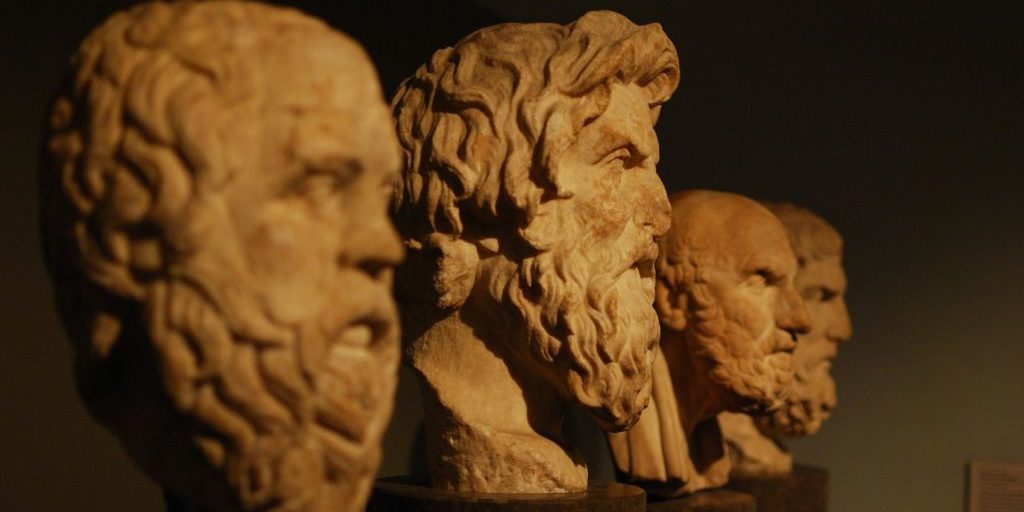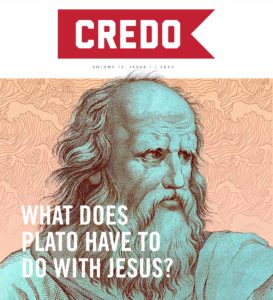
The Truth Will Set You Free
The latest issue of C redo Magazine focuses on Christian Platonism. The following is one of the issue’s featured articles by Paul Tyson. Dr. Tyson is an Honorary Senior Fellow at the Institute for Advanced Studies in the Humanities, University of Queensland.
redo Magazine focuses on Christian Platonism. The following is one of the issue’s featured articles by Paul Tyson. Dr. Tyson is an Honorary Senior Fellow at the Institute for Advanced Studies in the Humanities, University of Queensland.
Metaphysics concerns our partial understanding of the essential and transcendent truths of reality. Western modernity, and its post-modern progeny, firmly opposes the very idea of metaphysics. There are reasons for this, which we shall briefly touch on. But what about the New Testament? Does it express something we might call Christian metaphysics?
Metaphysics and Truth
The prologue of John’s gospel is about as metaphysically lush as any literature in the Western canon. John tells us that the Divine Logos is none other than the man, Jesus of Nazareth. Here capital ‘T’ Truth (essential, eternal, transcendent Truth) reaches into our world and is somehow made manifest in contingent and transitory space, time, language and culture. The Word was made flesh and dwelt among us, and in this way God communicates with us a very special ultimate Truth: himself. This is the Truth that redemptively transforms us and sets us free, if we abide in the word of the divine Word.
Two things should be carefully noted here. The speaker of Truth is not us, but God. Secondly, if we respond to the Word of God spoken into our lives with surrender and trust (the response of belief), then this Word of Truth is redemptively transformative of our very being, such that we are born of the Spirit. This pattern of divinely spoken Word and human response is spelled out seven times via the signs in John’s gospel. The miraculous signs point beyond the tangible miracles and signify the self-disclosure of God: those who have ears to hear and eyes to see the true significance of the signs of God, are saved; those who through pride and rebellion darken their spiritual vision and stop their spiritual ears, are judged. But one way or another, the Word of God always produces a response in us, either faith and salvation, or unbelief and judgment.Like in The Princess Bride, our smart philosophers now confidently assert that Socrates, Plato, and Aristotle were morons. Click To Tweet
Paul also unpacks aspects of the transformative action of God’s redemptive Word. Salvation entails the transformation of our minds (Rom. 12:2), such that we can see, and embrace, the high reality of who Christ really is (Col. 1:15–20) and become new beings in Christ (2 Cor. 5:17). We are not to be conformed to the pattern of this world (a pattern opposed to Truth), but we are to have the Mind of Christ (1 Cor. 2:16). The meaning of the Greek word we often translate as repentance – metanoia – does indeed mean a turning from sin and resting in God’s grace, but this tuning is a divinely enabled transformation of our mind (meta here means ‘totally transformative change’ and noia means ‘of mind’).
Illumination and Transformation
In sum, metaphysical illumination and transformation are integral to the Christian faith. Being miraculously transformed by the Spirit of Truth so that we can see and live in real Reality, is to have the mind of Christ and to see the violent necessities of ‘this world’ as distortions of reality, and – following Christ – to refuse to be bound by the elemental principles of ‘this world.’ Metaphysics – as the word itself indicates – implies a seeing beyond the immediate physical realm and into the spiritual realities on which the natural world rests. The carnal mind cannot see spiritual truth, only the Spirit of Truth enables us, by faith, to see things as they really are on that spiritual plane.
At this point, I can hear the modern protests. Am I trying to turn the gospel into a body and matter-hating Gnosticism? Am I reading the Hebraic New Testament as if it was written by Greek philosophers? I can also hear post-modern and phenomenological protests. Why do I use this metanarrative word “Truth”? All ‘truths’ are constructed and political, all language is inescapably a human artifact, and the Real is never knowable to us as we must always describe ‘the world’ only as it appears to us, never as it actually is.
I will now seek to briefly address the modern and postmodern suspicions of metaphysics, and of Christian metaphysics in particular. What follows may jump around a bit but the picture should come together at the end.
Modern and Postmodern Suspicions
First, Christian metaphysics is staunchly opposed to Gnosticism. The gnostics of the late Classical world believed that those ‘in the know’ would save themselves by their special knowledge and magical passwords, they believed that body and matter were either evil or of no importance, and they were private cults, and hence were never persecuted by the Roman imperium. Christianity was exactly what Gnosticism was not.
In the Church, God saves us, we do not save ourselves via our special magical knowledge. Christ taking up flesh and living in the world of matter, space and time (that God created) makes the body and the world intrinsically valuable. And Christianity was always a public faith, committed to public truth claims – notably that Jesus rather than Caesar is Lord – that got it into public trouble with the Roman Imperium. Christian metaphysics affirms all three of these anti-gnostic stances. Indeed, it could be argued that under the conditions of secular modernity the Church has never been more gnostically inclined, and more urgently in need of the corrective that decent Christian metaphysics would point to.Consumer Christianity means that we can anonymously float in and out of churches looking for an experience that suits our tastes where fellowship, worship, and God are there as addendums to my own choice and felt needs. Click To Tweet
In our day of ultra-mobility and virtuality, the body, physically bonded and located communities, and natural reality itself, are being bypassed in ways that late Classical gnostics could not have dreamed of. The manner in which Christians are atomized by modern consumer culture and can float free from closely-knit communities and the actual physical locality in which they live radically undermines the Christian practice of church life and her localized works of redemptive love. Consumer Christianity means that we can anonymously float in and out of churches looking for an experience that suits our tastes where fellowship, worship, and God are there as addendums to my own choice and felt needs. This is the mindset of our consumer world and it is not a true vision of reality; it is profoundly false and destructive.
Our liberal secular world tends to think of faith as the domain of private and free convictions, separated from the real workaday world and public concerns, just like the gnostic cults of old. And in more doctrinally cerebral churches, we are tempted to think that having the right doctrine is what saves us (just like the ancient gnostics) and evidence of the life and mind of Christ in our daily lives is somehow entirely secondary to our saving doctrines. We have become conformed to this secular consumeristic world in a way that is profoundly at odds with a Christian understanding of reality. We shall come back to this, but metaphysics is a highly practical feature of how we live our lives, for how we think about reality has an enormous impact on what actions and aims we pursue in our daily lives. The vision of the mind determines the assumed parameters of reality and normality in which we act; if we see the world in a different way, we will act differently. And actually, the Christian life entails a radically inverted vision of power and meaning to the ‘natural’ outlook of our highly competitive, non-spiritual, and self-interested workaday worlds.
As mentioned at the outset, modern philosophy is intrinsically suspicious of metaphysics. This needs a little unpacking for anyone interested in Christian metaphysics.

